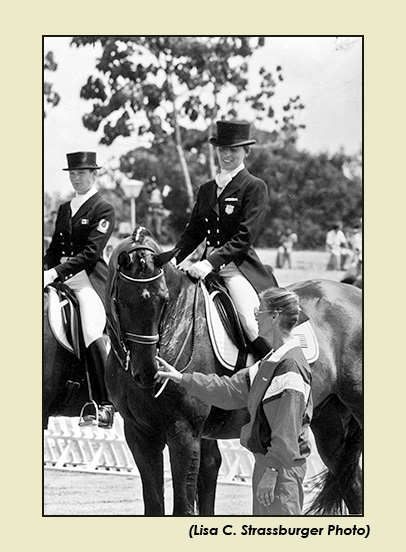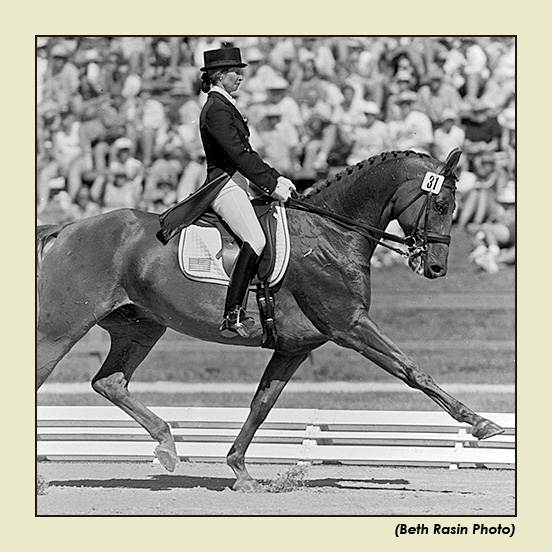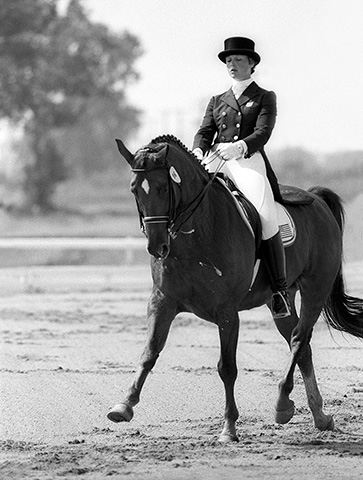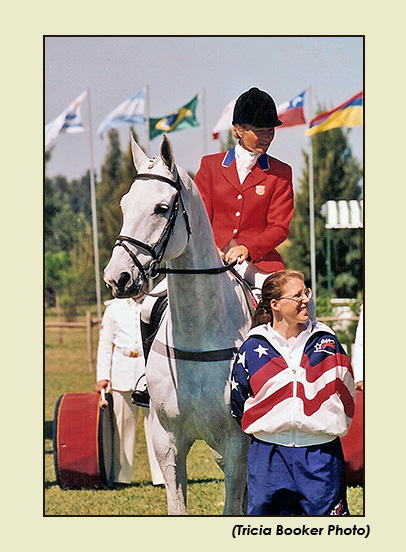For some Pan American Games competitors, the Games are a stepping-stone to more elite international
competition. For some, they’re a once-in-a-lifetime chance to represent their country. Regardless of the magnitude of the Pan Am experience in their careers, riders will always remember riding with the Stars and Stripes on their saddlepads. Here, some Pan Am veterans recall their moments of glory and the journeys they’ve taken since then.

Jennifer Miller-Disposti and Triomphe
1991 Havana, Cuba—team silver and individual silver in dressage.
Jennifer Miller-Disposti currently lives in Lebanon, N.J., where she and her husband run a restaurant. She also has a Grand Prix horse named Malachit. “He’s a lovely horse and very talented, but my mom died last year and I just don’t have the oomph to compete an awful lot anymore,” Miller-Disposti said.
“I was raised in a family that traveled a lot, so the fact that we got to go to Cuba was pretty amazing, because you couldn’t go there normally. I’d rather have gone to Cuba than anywhere else. We really got to know the Cuban people because Havana wasn’t ruined by tourism,” Miller-Disposti said.
“Our team was unique in that three out of four of us hadn’t represented the country before, so there was this tremendous team spirit. We got along so well, and everyone was so excited to be part of the team.
“It was my first time trying out for the team—I did the whole thing with my mom. She was my partner in my career since Day 1. We showed together and did it all ourselves, just the two of us. She came to Cuba with me as my groom. The way I see it, you can have the best horse in the world and all they have to do is trip before the tryouts and it’s over, so you had better have a lot of fun getting there.
“It was a huge deal to represent the country; I was so excited! I wasn’t one of those who had it as a goal all her life; it just happened. It was a shock to walk in the opening ceremonies with the brilliant athletes. Even seeing Fidel Castro was exciting. We just had a great team, everyone was so supportive of each other, and everyone liked each other. I felt that was special.
“The whole experience was awe-inspiring. I knew we had a great horse; I just never knew we were that good. But don’t let anyone think it isn’t one hell of a lot of work. You’re not just sitting there relaxing watching the events—every second you’re trying to think, ‘Should I walk him? Wrap him? Ride him?’ It’s not like you just hand them over to the U.S. Equestrian Team and let them do it. That was a little bit of a surprise for me. I thought I’d be a little more pampered, but, of course, you can’t be in the horse world if
you do it the way that we do it, but that’s the beauty of it.”

Betsy Rebar Sell and Wonderful Walden
1999 Winnipeg, Canada—team gold in dressage.
Betsy Rebar Sell and Wonderful Walden now compete at the Grand Prix level and were fourth in the Grand Prix freestyle at Dressage at Devon (Pa.) in 2006. She divides her time between Wellington, Fla., and Akron, Ohio.
“I was one of those kids whose dream was to ride for the USET. I had this book that was all about the USET, and it was one of those things I always wanted to do,” Sell said.
ADVERTISEMENT
“I’m a single mom, so I sacrificed a lot to get to Winnipeg. I had fairly young children at the time—my kids would travel with me and go to school in Wellington during the season. It disrupted our lives a lot.
“All of these things have to line up right. It’s a miracle that each one of those people and horses makes it to the top level—you have to be healthy, your horse does, you have to have a great year. Everything at that moment is so crucial. So I guess I really looked at the whole experience, starting with the whole [Festival of Champions selection trials] at Gladstone [N.J.] as one little miracle after another, culminating in a huge miracle—winning team gold at the Pan Am Games.
“One of the things that was really neat was that the USET would send out little postcards to people to solicit donations, and they would encourage people to write a note. It was really touching to get these messages of support from people who had never even met you. Individuals would send pictures of themselves with their horses. It was really fabulous to see that there were all these people behind you.”

Emily MacGowan and Jet Set
1987 Indianapolis, Ind.—team gold and individual silver in three-day eventing.
Emily MacGowan currently lives in Coopersburg, Pa., where she teaches, including for the local Pony Club, and helps hunter riders with their flatwork.
“The Pan American Games were the highlight of my life. Denny Emerson had suggested the fall before that qualifying for the Games be my goal for the year. It didn’t really occur to me that it would be an attainable goal, but he planted that seed and so that’s when I made a plan,” MacGowan recalled.
“It just happened that I had a good year, and everything just fell into place. It was my first advanced horse, so I think I was a little bit of a long shot, but my horse was a really, really good horse and it was a good partnership. I think I surprised myself!
“Ever since I was old enough to know what the Olympics where, that’s what I wanted to do. I’d always wanted to represent the United States. There was a huge amount of pride surrounding the experience of riding for your country. All of the sudden, I wasn’t just trying to do well for myself. It was a welcomed responsibility and an honor. I look back on the team experience and feel such tremendous joy that I was able to be a part of it.
“My favorite memory of the Games was cantering into the show jumping on the last day and seeing all those people in the stands cheering and clapping. It was a little bit of a nerve-wracking moment—I was going last because I was in first. How do you describe that pride that you feel that you’re representing your country, and that people across the United States are rallying for you? My horse loved the crowd. The more cheering there was, the more he puffed himself up.
“I really appreciated the closeness that you have with your teammates and the connection that you’re feeling with people on the team. Your performance matters to each other, and we all cared for each other so much. Michael Page [the chef d’equipe], the vets, the blacksmiths, the grooms, and the riders were all one big family.”

Ellin Dixon Miller and Windsor
1987 Indianapolis, Ind.—team silver in dressage.
Ellin Dixon Miller had already ridden in Europe before heading to the Pan American Games in Indianapolis. She later served as president of the U.S. Dressage Federation from 1994-1999. She currently serves as an honorary co-chairman for the USDF Campaign Committee. Windsor is retired in Pennsylvania. Miller teaches middle school math and social studies. Her husband, Bruce Miller, is still riding and competing in dressage, and her daughter, Hillary, shows in the hunters.
“The Games were a really great experience. I continued riding and competing for another 10 years, still doing quite a bit internationally. The experience in Indianapolis certainly helped to focus me and drive me forward competitively to where I wanted to be,” Miller said.
ADVERTISEMENT
“It was an amazing experience going in and getting your credentials with all these athletes you recognize. All of the sudden you’re doing all the same stuff with all the people getting all the press all the time—it makes you feel legitimate as an athlete.
“Our goal for the year was definitely to go to the Games. It’s always exciting to be able to ride with the flag, especially since that year the Games were here in the United States. You feel like you have this crowd behind you, cheering for the Americans. It makes it a cool experience. You feel so much support from people you don’t even know. Then there are people coming up asking for autographs, and it’s like, ‘This is weird!’
“Security was different in the middle of Indiana in that time than it is now. There was a lot more mingling with spectators than these days—not in the barns, but everywhere else. You’d go and do your test and you come out, and there are people everywhere. ‘Spud’ was funny; he’d love to stand and play with people. He would have a great time trying to play with the kids. He stole one kid’s parrot mascot and liked it so much, so we ended up having to buy him his own for his stall.
“At this point I’m retired from showing, and I haven’t ridden in nine years. I’m a horse show mom who tries not to be too much of a horse show mom! I drive the trailer and help her tack up, and then as soon as the trainer is in sight I go sit in the stands until I’m needed for something.”

Denise Rath and Galliard
1995, Buenos Aires, Argentina—team silver in eventing.
Rath still events actively at the advanced level and below, training out of Great Falls, Va. Her Pan Am partner, Galliard, passed away in February at age 23.
“It’s a once-in-a-lifetime experience. It was my first, and to-date last, time I was on the U.S. team. My teammates were all very enjoyable. I was very fortunate to be on the team with Bruce Davidson. He was a very good influence because we were all somewhat inexperienced. He was a very good leader, and he gave us a lot of good guidance,” Rath said.
“Buenos Aires was a very nice place. Because the event was a bit removed from the Games, we didn’t stay in the athlete’s village or partake in the festivities or see the other sports. So, in a way it was little bit like any other competition.
“But I still remember one of the most dramatic moments, on show jumping morning. We all had our [red] coats on, and we were walking down to walk the show jumping course. You walk in the stadium, and it hits you—I’m on a team. I’m representing the United States. It was very emotional to me. The rest of it had felt very much like just another competition, but that morning it hit that it was a big deal. That was the highlight of the whole thing for me, that feeling of, ‘This is what it means to be part of a team.’
“With my Pan Am experience, I learned that getting on the team is a big deal, and staying there is a lot harder than you think. All of these kids who want to go and ride for the United States and go to the Olympics have to realize that it’s a lot of hard work to get there. It’s a lot of blood, sweat and tears. I guess you always wonder if it’s worth the effort. I admire these people who are on the team year after year because you give up a lot to do that. It opened my eyes to the whole team experience. It was worth it. Whether I want to do it again, I’m not sure, but I’m glad I did it.”
Mollie Bailey and Molly Sorge





